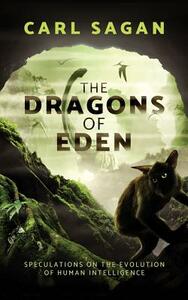Take a photo of a barcode or cover
128 reviews for:
The Dragons of Eden: Speculations on the Evolution of Human Intelligence
Carl Sagan
128 reviews for:
The Dragons of Eden: Speculations on the Evolution of Human Intelligence
Carl Sagan
A fascinating book that hasn't aged as well as I would have hoped.
Carl Sagan was a legend, he managed to explain complicated subjects with such simplicity and passion that you can't help but be interested. The Demon-Haunted World (also by Sagan) is still my favourite non-fiction book of all time.
Dragons of Eden is a collection of recently learned facts by Sagan himself, and his speculations on said facts. The main problem I have is that a lot of the 'facts' are outdated. The triune brain is used as a foundation for a lot of his ideas, and to his credit they're intelligent, interesting and hopeful. But since the foundation is dilapidated at this point—an outdated, inaccurate notion to most neurologists of the modern day—a lot of it is unfortunately flawed.
Sagan does precede the book with warnings that he is not an expert on a lot of the subjects he talks about. It seems like he was very excited about a lot of this recently acquired information from the experts of the time, and couldn't help but write a book about it. I don't blame him.
Having said all that, there are chapters that have aged very well. When talking about ancient philosophy, or how humanity locks away animals that still have so much evolutionary potential, the book is brilliant. And overall it reads very, very well. The man knew how to write.
If anything, the shortcomings of Dragons of Eden make me think about the science books I've read from the last decade. How much foundational knowledge will be outdated? It also is a warning that I can't just read about one subject, then go through the rest of my life thinking the consensus won't change. This may be common sense to some, and of course I've thought about it before, but it's come to the forefront of my vision now, and cannot be ignored.
I still do think this book is worth reading, and of merit. Just take the speculations on the brain with a handful of salt.
Carl Sagan was a legend, he managed to explain complicated subjects with such simplicity and passion that you can't help but be interested. The Demon-Haunted World (also by Sagan) is still my favourite non-fiction book of all time.
Dragons of Eden is a collection of recently learned facts by Sagan himself, and his speculations on said facts. The main problem I have is that a lot of the 'facts' are outdated. The triune brain is used as a foundation for a lot of his ideas, and to his credit they're intelligent, interesting and hopeful. But since the foundation is dilapidated at this point—an outdated, inaccurate notion to most neurologists of the modern day—a lot of it is unfortunately flawed.
Sagan does precede the book with warnings that he is not an expert on a lot of the subjects he talks about. It seems like he was very excited about a lot of this recently acquired information from the experts of the time, and couldn't help but write a book about it. I don't blame him.
Having said all that, there are chapters that have aged very well. When talking about ancient philosophy, or how humanity locks away animals that still have so much evolutionary potential, the book is brilliant. And overall it reads very, very well. The man knew how to write.
If anything, the shortcomings of Dragons of Eden make me think about the science books I've read from the last decade. How much foundational knowledge will be outdated? It also is a warning that I can't just read about one subject, then go through the rest of my life thinking the consensus won't change. This may be common sense to some, and of course I've thought about it before, but it's come to the forefront of my vision now, and cannot be ignored.
I still do think this book is worth reading, and of merit. Just take the speculations on the brain with a handful of salt.
informative
inspiring
reflective
medium-paced
It was very thought-provoking, I want to read it again, it is not like properly scientific but still it is so enjoyable to think about human brain's evolution and the complexities of human intelligence.
informative
medium-paced
One of the lesser points Sagan introduces is the analytical check our "left" brain must impose on our "right" brain's more intuitive connections. Ironically I would argue that Sagan's hesitance to check himself was this book's biggest failure. Often he excitedly drew out connections, usually preceded by a phrase such as "I wonder," that do not stand his left-brained test of reason.
With that said, I found the book worth the read. Sagan draws up a quick tour of human evolutionary lineage with a focus on our neocortical developments. He also always had a ready comparison to primates in order to more
fully showcase what makes us "human". As always, the line is thinner and more vague than many more orthodox religions would like to believe.
One major takeaway was the human ability, through the development of the neocortex, to have built-in "intelligence", I.e. analytical thinking, as compared to "instinct". Whereas instinctual information is programmed into tightly packed DNA (and is therefore limited in nature) and survives solely off adaptive selection, intelligence (or extragenetic info) resides in a larger brain capacity.. it is the ability to think on the fly and respond successfully to innumerable changing environments and situations.
Sagan introduces many other varying ideas and usually does a good job supporting them scientifically. All in all, if you ignore anything he says about aliens or computers, it's a good read.
With that said, I found the book worth the read. Sagan draws up a quick tour of human evolutionary lineage with a focus on our neocortical developments. He also always had a ready comparison to primates in order to more
fully showcase what makes us "human". As always, the line is thinner and more vague than many more orthodox religions would like to believe.
One major takeaway was the human ability, through the development of the neocortex, to have built-in "intelligence", I.e. analytical thinking, as compared to "instinct". Whereas instinctual information is programmed into tightly packed DNA (and is therefore limited in nature) and survives solely off adaptive selection, intelligence (or extragenetic info) resides in a larger brain capacity.. it is the ability to think on the fly and respond successfully to innumerable changing environments and situations.
Sagan introduces many other varying ideas and usually does a good job supporting them scientifically. All in all, if you ignore anything he says about aliens or computers, it's a good read.
An absolutely exhilarating read, that got me excited for the past and the future of mankind. Carl Sagan talks about subject so important in a captivating, funny and intelligent way, giving the reader a chance to discover speculations and think further on them. He brings out parallels between fiction and non-fiction, giving even the people not that comfortable with science a way to understand scientific theories. A mandatory read for any human being who cares about the future of mankind.
inspiring
reflective
informative
reflective
medium-paced
Have you ever wondered how the brain works and how our intelligence evolved? If your brain has presented to you this question, then this might just be the book for you. Your brain wants to know about itself! Whoa.
Firstly, this book was written in the 70's so its possible that some of the information contained here is out of date. Regardless of that fact however, Carl Sagan has that certain charm and special way of writing about subjects and makes it a joy to read. Although he does warn you that Chapter 2 gets super technical and jargon-heavy, the rest of the book is smooth sailing.
Sagan writes about the triune brain model and how the brain has evolved into 3 layers; the R-Complex which is where our reptilian brain functions stem from (aggression and territorial behavior) and is the oldest part of the brain, the Limbic System (social emotions) and the Neocortex (sight, sound, knowledge absorption). He also speaks about the left and right hemispheres and how they interact with one another to absorb knowledge and to be able to come up with solutions and theories.
There is information contained within these pages about our early ancestors like Australopithecus, Homo Erectus and Homo Habilis and show how the different sizes of the fossilized skulls show the progression of the size of the brain. Sleep and dreams are also talked about as well as how our distant cousins, the apes, can learn ASL and show some form on intelligence. It begs the question; If other mammals on this planet exhibit a form of intelligence, why don't we take better care of them and instead lock them up in zoos?
The book was a bit hard to get into but I thoroughly enjoyed it. Sagan asks more questions than he gives answers so it turned out to be a great exercise for my brain (maybe that's what my brain wanted all along!) If you want to think critically and expand your horizons a bit, give this gem a shot!
Firstly, this book was written in the 70's so its possible that some of the information contained here is out of date. Regardless of that fact however, Carl Sagan has that certain charm and special way of writing about subjects and makes it a joy to read. Although he does warn you that Chapter 2 gets super technical and jargon-heavy, the rest of the book is smooth sailing.
Sagan writes about the triune brain model and how the brain has evolved into 3 layers; the R-Complex which is where our reptilian brain functions stem from (aggression and territorial behavior) and is the oldest part of the brain, the Limbic System (social emotions) and the Neocortex (sight, sound, knowledge absorption). He also speaks about the left and right hemispheres and how they interact with one another to absorb knowledge and to be able to come up with solutions and theories.
There is information contained within these pages about our early ancestors like Australopithecus, Homo Erectus and Homo Habilis and show how the different sizes of the fossilized skulls show the progression of the size of the brain. Sleep and dreams are also talked about as well as how our distant cousins, the apes, can learn ASL and show some form on intelligence. It begs the question; If other mammals on this planet exhibit a form of intelligence, why don't we take better care of them and instead lock them up in zoos?
The book was a bit hard to get into but I thoroughly enjoyed it. Sagan asks more questions than he gives answers so it turned out to be a great exercise for my brain (maybe that's what my brain wanted all along!) If you want to think critically and expand your horizons a bit, give this gem a shot!
Emocionante, fabuloso, apasionante, fascinante. La forma de explicar y ligar múltiples temas alrededor de la evolución del cerebro y la inteligencia es bella.
challenging
informative
medium-paced



